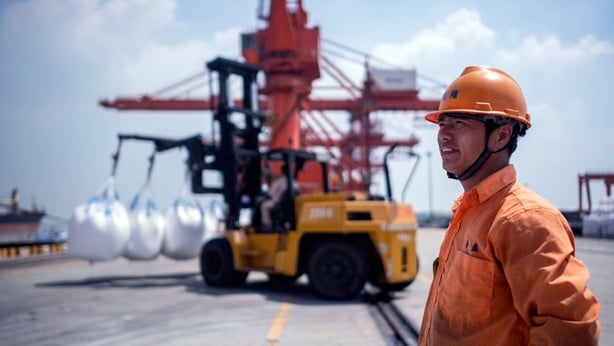US President Donald Trump said he was in no hurry to sign a trade deal with China as Washington imposed a new set of tariffs on Chinese goods.
Negotiators entered a second day of last-ditch talks to try to salvage an agreement.
The United States increased its tariffs early today on $200 billion in Chinese goods to 25% from 10%.
The promise of the move has been rattling financial markets, already worried the 10-month trade war between the world's two largest economies could spiral out of control.
The move, which is expected to lead China to retaliate, went into effect just hours after US Trade Representative Robert Lighthizer, US Treasury Secretary Steven Mnuchin and Chinese Vice Premier Liu He ended a first day of talks in Washington without a deal.
They resumed negotiations on Friday morning.
In a series of morning tweets, Trump defended the tariff hike and said he was in "absolutely no rush" to finalise a deal, adding that the US economy would gain more from the levies than any agreement.
"Tariffs will bring in FAR MORE wealth to our country than even a phenomenal deal of the traditional kind," Trump said in one of the tweets.
We need your consent to load this rte-player contentWe use rte-player to manage extra content that can set cookies on your device and collect data about your activity. Please review their details and accept them to load the content.Manage Preferences
Despite Trump's insistence that China will absorb the cost of the tariffs, US businesses will pay them and likely pass them on to consumers.
Since last year, the two sides have exchanged tariffs on more than $360 billion in two-way trade, gutting US agricultural exports to China and weighing on both countries' manufacturing sectors.
Donald Trump began the trade war because of complaints about unfair Chinese trade practices.
The US team met Trump last night to brief him and "agreed to continue discussions tomorrow morning at USTR," the White House said in a statement.
Lighthizer and Mnuchin met with the Chinese delegation for about 90 minutes yesterday. The White House statement said they also had a working dinner with Liu, who is leading the Chinese side.
"We hope the US and the Chinese side can meet each other halfway and work hard together to resolve existing problems through cooperation and consultation," the Chinese commerce ministry had earlier said in a statement.
Despite optimism from officials in recent weeks that the talks were moving towards a deal, tensions reignited this week after Trump angrily accused China of trying to backpedal on its commitments.
"They took many, many parts of that deal and they renegotiated. You can't do that," Trump said yesterday.
But he held out hopes of salvaging a deal.
"It's possible to do it," Trump said. "I did get last night a very beautiful letter from President Xi (Jinping)."
At the same time, he said he would be equally satisfied to simply keep tariffs in place. And he has threatened to extend the tough duties to all Chinese goods.
The International Monetary Fund has called for a rapid resolution, warning that the trade battle was a "threat" to global growth.

Liu said on his arrival in Washington that the prospects for the talks were "promising," but warned that raising tariffs would be "harmful to both sides," and called instead for cooperation.
"I hope to engage in rational and candid exchanges with the US side," he told Chinese state media.
"Of course, China believes raising tariffs in the current situation is not a solution to the problem, but harmful to China, to the United States and to the whole world," he added.
The higher duty rates will hit a vast array of Chinese-made electrical equipment, machinery, auto parts and furniture.
But due to a quirk in the implementation of the higher tariffs, products already on ships headed for US ports before midnight will only pay the previous 10% duty rate, US Customs and Border Protection explained.
That could effectively provide a grace period for the sides to avert serious escalation.
China had earlier threatened to raise tariffs on $60 billion of US imports but held off amid a trade war truce.
It could also use other tactics to disrupt business for US firms in China.
The US is pressing China to change its policies on protections for intellectual property and massive subsidies for state-owned firms, in a bid to reduce the yawning trade deficit.
Washington is counting on the strong US economy to be able to withstand the impact of higher costs from the import duties and retaliation better than China, which has seen its growth slow.
While American companies complain of lost export markets, disrupted supply chains and higher costs, the US continues to see steady growth and falling unemployment.

